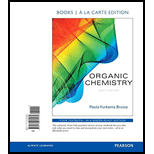
Concept explainers
Interpretation:
5-Bromouracil causes mutations in DNA. Reason for this should be determined.
Concept introduction:
A parent DNA molecule consists of two poly
A base is nitrogen containing heterocyclic compound which is found in DNA and RNA.
There are mainly five nitrogen bases.
- (1) Adenine
- (2) Guanine
- (3) Cytosine
- (4) Thymine
- (5) Uracil
In DNA Adenine always makes a double bond with Thymine (
Enol is a tautomer which exhibiting a special type of functional isomerism namely tautomerism.
Tautomerism is a special type of functional isomerism in which isomers are in dynamic equilibrium with each other.
Mutation is the process that results in change in the sequence of the DNA, and the compound which causes mutation is known as mutagenic compound.
Trending nowThis is a popular solution!

Chapter 26 Solutions
Organic Chemistry, Books a la Carte Edition (8th Edition)
- How do I solve this Alkyne synthesis homework problem for my Organic Chemistry II class? I have to provide both the intermediate products and the reagents used.arrow_forwardSubstance X is known to exist at 1 atm in the solid, liquid, or vapor phase, depending on the temperature. Additionally, the values of these other properties of X have been determined: melting point enthalpy of fusion 90. °C 8.00 kJ/mol boiling point 130. °C enthalpy of vaporization 44.00 kJ/mol density 2.80 g/cm³ (solid) 36. J.K mol (solid) 2.50 g/mL (liquid) heat capacity 32. J.Kmol (liquid) 48. J.Kmol (vapor) You may also assume X behaves as an ideal gas in the vapor phase. Ex Suppose a small sample of X at 50 °C is put into an evacuated flask and heated at a constant rate until 15.0 kJ/mol of heat has been added to the sample. Graph the temperature of the sample that would be observed during this experiment. o0o 150- 140 130- 120- 110- 100- G Ar ?arrow_forwardMechanism. Provide the mechanism for the reaction below. You must include all arrows, intermediates, and formal charges. If drawing a Sigma complex, draw all major resonance forms. The ChemDraw template of this document is available on Carmen. Br FeBr3 Brarrow_forward
- Check the box under each compound that exists as a pair of mirror-image twins. If none of them do, check the none of the above box under the table. CH3 OH CH3 CH2 -CH-CH3 CH3 OH OH CH-CH2-CH- -CH3 CH3 CH3 OH OH CH3 C -CH2- C. -CH3 CH3- -CH2- -CH-CH2-OH OH CH3 none of the above كarrow_forwardWrite the systematic name of each organic molecule: structure Η OH OH OH OH H namearrow_forwardDraw the skeletal ("line") structure of a secondary alcohol with 5 carbon atoms, 1 oxygen atom, at least one ring, and no double or triple bonds. Click and drag to start drawing a structure. : ☐ ☑ ⑤arrow_forward
 Introduction to General, Organic and BiochemistryChemistryISBN:9781285869759Author:Frederick A. Bettelheim, William H. Brown, Mary K. Campbell, Shawn O. Farrell, Omar TorresPublisher:Cengage Learning
Introduction to General, Organic and BiochemistryChemistryISBN:9781285869759Author:Frederick A. Bettelheim, William H. Brown, Mary K. Campbell, Shawn O. Farrell, Omar TorresPublisher:Cengage Learning
 Organic ChemistryChemistryISBN:9781305580350Author:William H. Brown, Brent L. Iverson, Eric Anslyn, Christopher S. FootePublisher:Cengage Learning
Organic ChemistryChemistryISBN:9781305580350Author:William H. Brown, Brent L. Iverson, Eric Anslyn, Christopher S. FootePublisher:Cengage Learning


